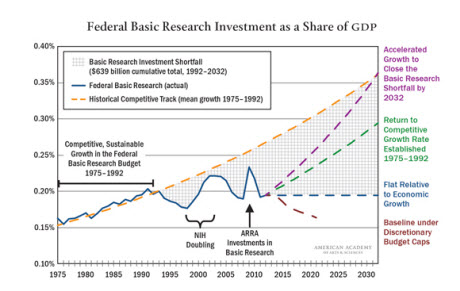Academic Leaders on the Troubled Future of Biomedical Research
AAAS discussion targets changing financial environment for biomedical research.
 Vanderbilt Provost Susan Wente during a discussion on biomedical research Tuesday at Duke. Other panelists include Duke's School of Medicine Dean Dr. Nancy Andrews, National Cancer Institute Director Harold Varmus and biologist Tania Baker of MIT.Jared Lazarus/Duke PhotographyAcademic biomedical research -- most of it funded by the U.S. government -- has long been the abundant headwaters of the world's pharmaceutical and medical device industries.
Vanderbilt Provost Susan Wente during a discussion on biomedical research Tuesday at Duke. Other panelists include Duke's School of Medicine Dean Dr. Nancy Andrews, National Cancer Institute Director Harold Varmus and biologist Tania Baker of MIT.Jared Lazarus/Duke PhotographyAcademic biomedical research -- most of it funded by the U.S. government -- has long been the abundant headwaters of the world's pharmaceutical and medical device industries.
But this system that has flourished in the post World War II period has become seriously ill, a panel of biomedical scholars said at a Tuesday evening event in the MDB Trent Semans Great Hall.
"The biomedical research enterprise in this country is without parallel in the world," National Cancer Institute Director and Nobel Laureate Harold Varmus said during the discussion. "But life in this world is not what it used to be."
The American Academy of Arts and Sciences brought Varmus and a handful of other leading biomedical researchers together at Duke University to hold a closed-door discussion of the problems, which was followed by a public forum for about 200 members of the Duke community. Duke Medical School Dean Nancy Andrews and Duke Provost Sally Kornbluth co-moderated the panel. President Richard Brodhead gave the introductory remarks, and AAAS president Jonathan Fanton presided.
Vanderbilt Provost Susan Wente said younger scientists in the biomedical research pipeline are experiencing "late launch" -- median age 37 at first faculty job, median age 42 at first RO-1 grant. The median post-doctoral fellowship now lasts 7.8 years, she said, which comes after 5 years of graduate school. It's simply too long, the panelists agreed.
"We have created an artificial economy in terms of our training programs and how we move people through them," Wente said. Only the characteristic passion, optimism and willingness to take risks one finds in scientifically minded people continues to attract them to this daunting academic path, Wente said.
At the same time, federal funding for biomedical research has dipped after decades of sustained and sometimes rapid growth and it shows no signs of recovering, the panelists said. The number of grant applications being submitted to the NIH has continued to grow while pool of funding opportunities has shrunk.
"We have too many people pursuing too little research support," Varmus said. "This Malthusian dilemma has created a sense of hyper-competition."
The pipeline is going to need to be "right-sized," Kornbluth said.
 Duke UniversityMIT biochemist Tania Baker said scholars agree that timelines need to be shortened for trainees, but nobody is sure which answers will work.
Duke UniversityMIT biochemist Tania Baker said scholars agree that timelines need to be shortened for trainees, but nobody is sure which answers will work.
Making a terminal masters degree more practical and less stigmatized would be one option, Baker said, as would be creating more positions for salaried lab assistants rather than relying on post-docs. "But right now, it's hard to figure out how to fund those people."
The panel's comments focused mainly on the younger end of the biomedical research system rather than senior scholars. Phrases such as "trimming the people who are not thriving" and "pinching the pipeline earlier," were expressed by panelists.
The audience, already restive about the situation, didn't come away assured.
"The first thing I heard Varmus say is that there are way too many students," second-year grad student Nandan Gokhale said after the discussion.
"But it's not clear to me how more science will get done by fewer people," biochemistry department administrator Margot Wuebbens said. Scientists need to lobby more aggressively for their needs, she said.
Panel members travelled to Washington on Wednesday to speak with policy makers, and the AAAS will take these discussions, based on a AAAS report called "Restoring the Foundation," on the road, including an April panel at Rice University in Houston.
So far, Brodhead said, Congress' response to the federal budget deficit "is creating another deficit," one of talent and future investment.
"In responding to the federal budget deficit by paring investments in research," Brodhead said, "Congress is creating another deficit in talent, discovery and innovation--the keys to a prosperous future."
